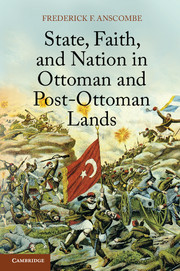Book contents
- Frontmatter
- Dedication
- Contents
- List of Maps and Images
- Acknowledgments
- Transliteration and Abbreviations
- Maps
- Introduction
- Part I The Ottoman Empire
- 1 State, Faith, Nation, and the Ottoman Empire
- 2 The Premodern Islamic State and Military Modernization
- 3 The Breaking of the Premodern Islamic State
- 4 The Reconstructed Muslim State
- 5 End of Empire
- Part II From Ottoman to Post-Ottoman States
- Part III Contemporary Post-Ottoman States
- Conclusion State, Faith, and Nation
- Bibliography
- Index
- References
4 - The Reconstructed Muslim State
Published online by Cambridge University Press: 05 June 2014
- Frontmatter
- Dedication
- Contents
- List of Maps and Images
- Acknowledgments
- Transliteration and Abbreviations
- Maps
- Introduction
- Part I The Ottoman Empire
- 1 State, Faith, Nation, and the Ottoman Empire
- 2 The Premodern Islamic State and Military Modernization
- 3 The Breaking of the Premodern Islamic State
- 4 The Reconstructed Muslim State
- 5 End of Empire
- Part II From Ottoman to Post-Ottoman States
- Part III Contemporary Post-Ottoman States
- Conclusion State, Faith, and Nation
- Bibliography
- Index
- References
Summary
For almost seventy years, from the accession of Abdülmecid in 1839 to the “Young Turk” revolution of 1908, the political history of the Ottoman empire revolved around the need to manage, if not resolve, a tangled knot of problems inherited from Mahmud’s era: closing the rifts within the Ottoman Muslim community and thereby restoring the state’s legitimacy in the eyes of its core population; using that legitimacy to intensify exploitation of the physical and financial resources of the population in order to strengthen the empire’s military and administrative capacities; deflecting the often-conflicting diplomatic and economic pressures exerted by Christian Europe; and keeping the non-Muslim population sufficiently content to foreclose opportunities for interference by foreign powers. In comparison to regimes in Istanbul over preceding decades, imperial authorities after 1839 managed the challenges well, rebuilding the state as a modern, relatively efficient entity but with its domestic legitimacy as a power identified with the defense of Islam and of justice restored to an adequate level. The struggle to balance strengthening with observance of moral limits to state power never ended, however, and the tension caused by growing authoritarianism in government and weakening ability of the state to protect Muslim interests led to a peculiarly haphazard military coup in 1908 that signaled a change in the direction of governance.
- Type
- Chapter
- Information
- State, Faith, and Nation in Ottoman and Post-Ottoman Lands , pp. 90 - 120Publisher: Cambridge University PressPrint publication year: 2014
References
- 1
- Cited by



